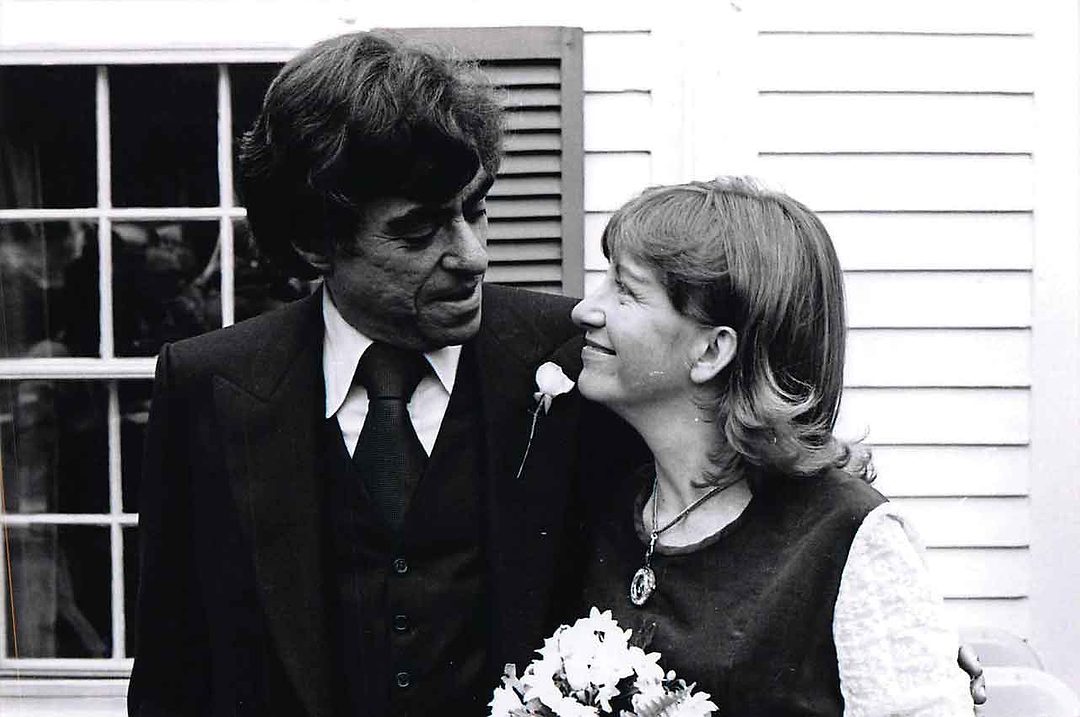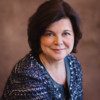“I speak tonight for the dignity of man and the destiny of democracy. At times, history and fate meet at a single place and a single time to shape a turning point in man’s unending search for freedom. So it was in Lexington and Concord, so it was a century ago at Appomattox, so it was last week in Selma, Alabama.”
— President Lyndon B. Johnson, 1965 (speech written by Dick Goodwin)

Concord is an interesting place. It’s filled with the sites and stories of the American Revolution. You can literally walk in the footsteps of the great American transcendentalist writers such as Thoreau and Emerson. General Lafayette stopped here on his farewell tour of America in 1824. There is something about this small town that continues to draw magnetic personalities who shape our country over and over.
One such luminary is Doris Kearns Goodwin – Pulitzer Prize-winning author, respected presidential historian, and wife of the internationally acclaimed presidential speechwriter, the late Richard (Dick) Goodwin. Together, this inspirational couple witnessed the turbulent events of the 1960s and worked hard to do their part in shaping a more positive outcome for future generations.
Living the History of the 1960s
Doris’ interest in leadership began as a professor at Harvard and was deeply shaped by her work for Lyndon B. Johnson, both during his time in the White House and later as she assisted him in writing his memoirs. These experiences led to her first book, Lyndon Johnson and the American Dream. She followed up with the Pulitzer Prize-winning book, No Ordinary Time: Franklin and Eleanor and the Home Front in World War II. She earned the Lincoln Prize for the runaway bestseller Team of Rivals, the basis for Steven Spielberg’s award-winning film Lincoln, and the Carnegie Medal for The Bully Pulpit: Theodore Roosevelt, William Howard Taft, and the Golden Age of Journalism.
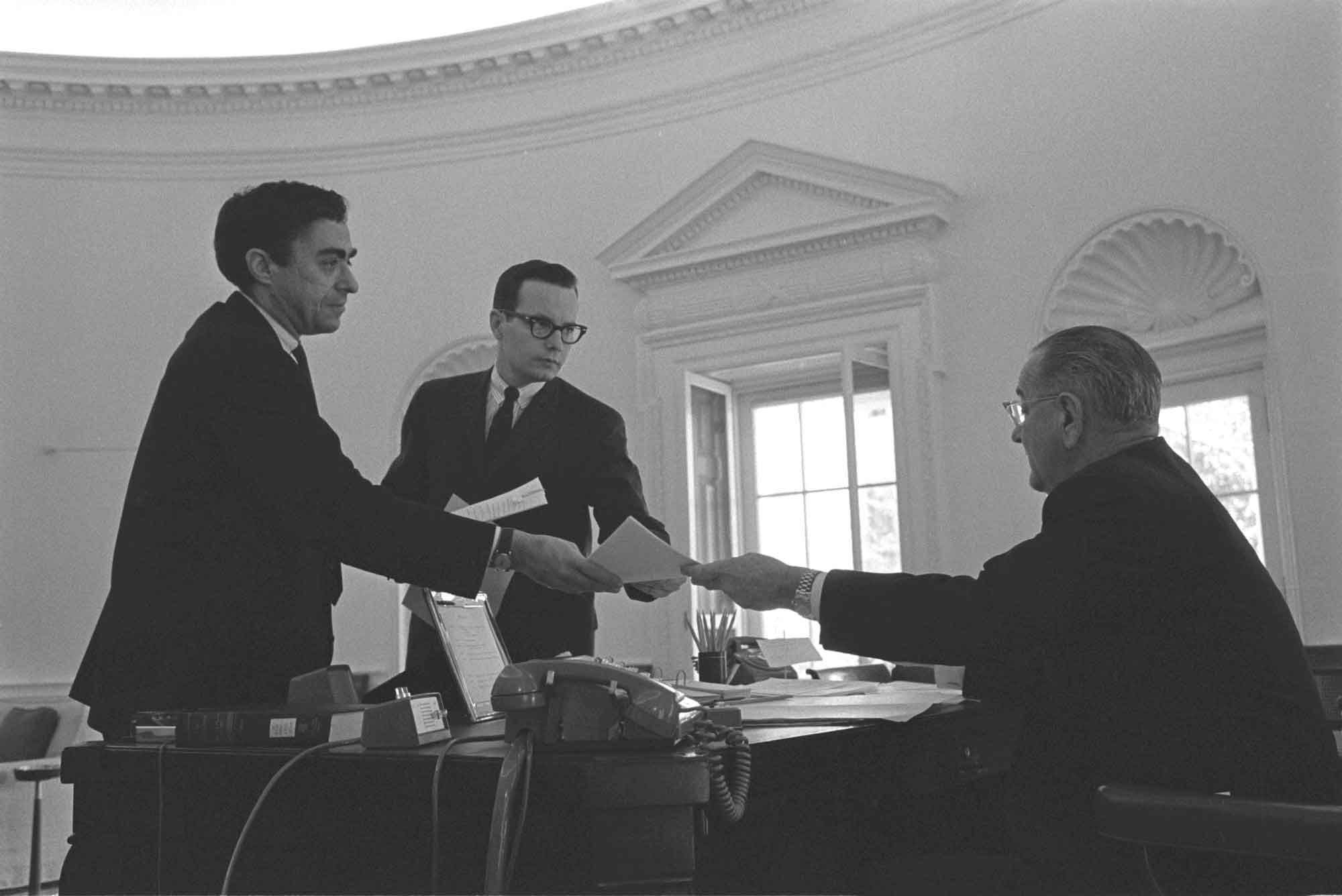
Dick Goodwin working with President Johnson in 1965
Dick Goodwin was a senior advisor and speechwriter for Presidents John F. Kennedy and Lyndon B. Johnson. His work helped shape both politics and public policy. After John F. Kennedy’s assassination, it was Dick Goodwin who arranged for an eternal flame to be lit at the presidential burial site in Arlington National Cemetery. When Robert F. Kennedy was shot in Los Angeles, it was Dick Goodwin who sat vigil with family members and other aides until Kennedy was pronounced dead.
Dick helped craft many important political speeches, including JFK’s first major address on Latin American affairs, Robert Kennedy’s 1966 “Ripple of Hope” anti-apartheid speech, and even Al Gore’s concession speech after the 2000 election.
In 1965, President Johnson relied on his young advisor to craft one of the most famous speeches in presidential history, in the wake of horrific violence inflicted on peaceful marchers in Selma, Alabama. The resulting “We Shall Overcome” speech propelled a nation forward and led to the historic Voting Rights Act.
A Love Story in a Turbulent World
Dick and Doris met in 1972. She was a young professor at Harvard, and he was a brash and brilliant political consultant and speech writer. Their relationship was intellectual and emotional magic from their first meeting.
“We started a conversation that afternoon about everything – about music, astronomy, sex, LBJ, the beleaguered Red Sox, and more,” recounted Doris. “We went to dinner and the conversation didn’t stop. It never stopped the rest of our lives.”
They soon married and eventually moved to Concord, where they lived for more than four decades. Here, they gathered almost nightly with local friends to discuss and debate the issues of the day. This sort of lyceum both bridged and continued the traditions that form the basis of Concord culture – a passion for social justice, drawing inspiration from nature, and a dedication to holding leadership accountable and speaking truth to power.
“It was the adventure of a lifetime being married for 42 years to this incredible force of nature – the smartest, most interesting, most loving person I have ever known,” she said. “How lucky I have been to have had him by my side as we built our family and our careers together – surrounded by close friends in a community we love.”
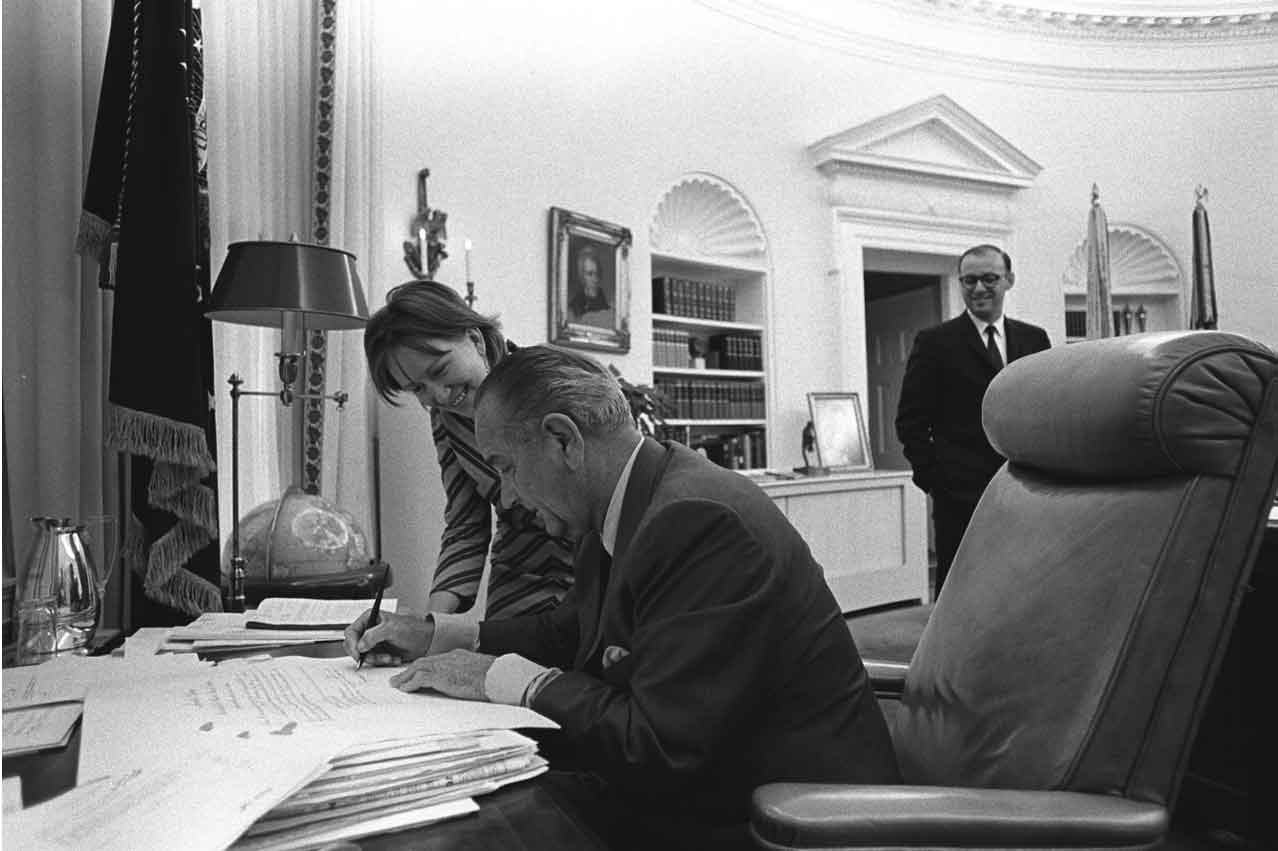
Doris working with LBJ in 1968
Bringing History to Life
Doris shared the story of a fateful morning, shortly after Dick had turned 80. He came down the stairs in the morning, singing “Oh, What a Beautiful Morning.” “Ok,” said Doris “why are you so happy this morning?”
He responded, “I’ve decided it’s time to open the boxes.” And Doris knew exactly what he meant. For their entire married life, 300 boxes had followed them around from one place to another – from basements to barns to storage.
“The boxes were an incredibly complete time capsule of the 60s. But Dick hadn’t wanted to open them all those years,” said Doris. “He was everywhere you wanted him to be with JFK, with LBJ, with Jackie Kennedy, with Robert Kennedy, with Senator Eugene McCarthy in New Hampshire – and he saved everything.
But the decade had ended too sadly with the death of Robert Kennedy. Dick was with him when he died. Bobby was his closest friend in public life. His death, together with Martin Luther King’s assassination, the riots in the cities, and the campus violence that was going on had cast a dark curtain on Dick’s memory of the 60s. For decades, he just wanted to move ahead rather than look backward.”
But the passage of time inspired Dick. “If I have any wisdom to dispense, I’m past 80. I had better start dispensing it now,” he said. And so, they embarked on a great adventure – opening that time capsule and diving into a rediscovery of the events, people, and politics that shaped a nation throughout an important chapter of American history.
“Combing through these papers reconnected us with participants and witnesses of pivotal moments of the 1960s. It gave us an important final mission in the last chapter of Dick’s life – and bringing those voices to life for the public has been deeply important to me,” said Doris.
Sadly, Dick passed away before their work together was complete. But the spark had been ignited, and Doris would work through her grief and eventually go on to finish what she and her husband had begun together. The resulting book, An Unfinished Love Story: A Personal History of the 1960s, is equal parts biography of Dick Goodwin and a deeply insightful glimpse into the human, political, and cultural response to the turbulent 1960s. The stories may have hailed from half a century ago, but they are strangely resonant with the America of today.
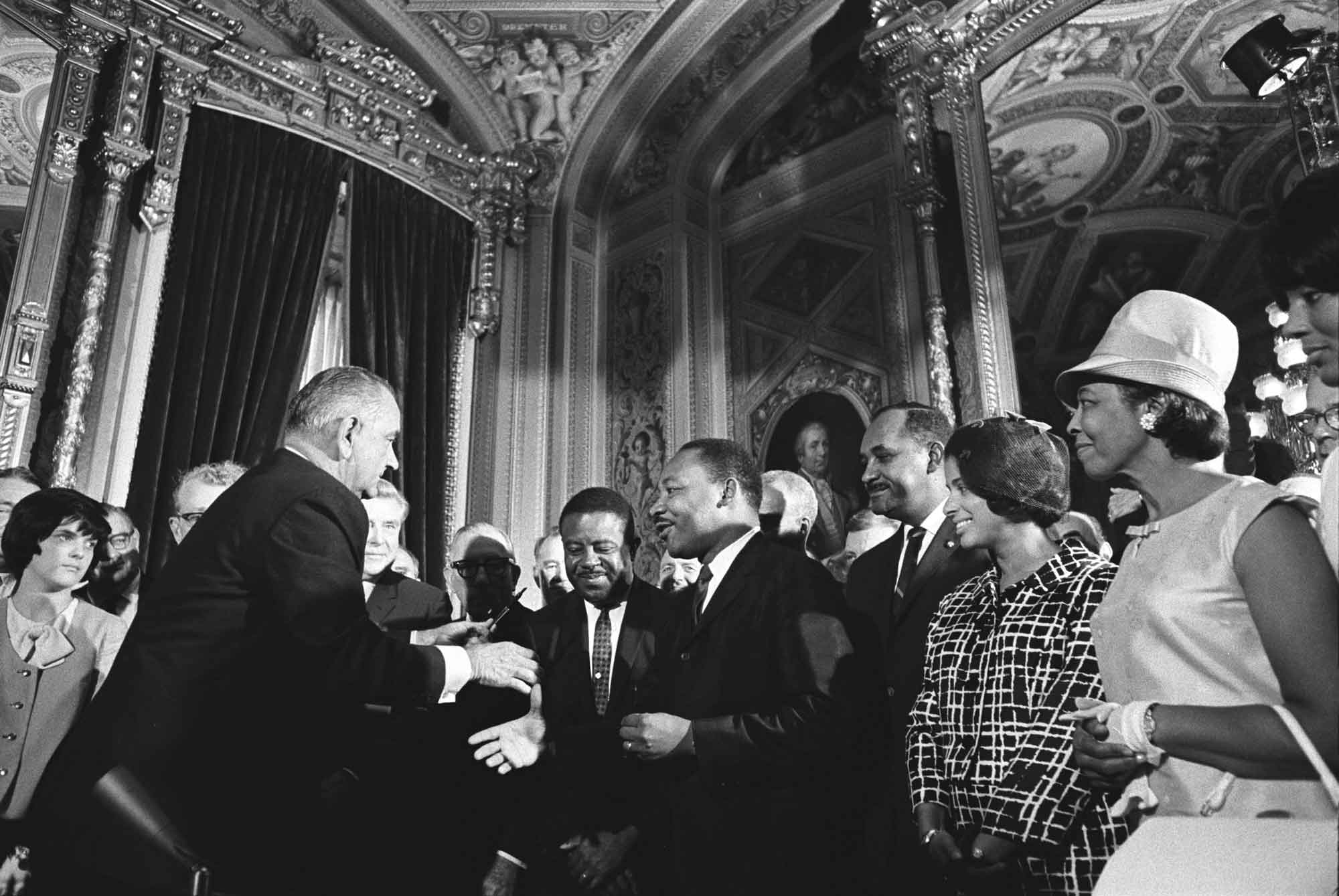
LBJ signs the Voting Rights Act
Hope for a New Generation
In a touching full-circle moment this past spring, Doris stepped up to the podium at the Goodwin Forum in the Concord Free Public Library – a public lecture hall named in honor of Dick and Doris. That momentous quote from the Selma speech is displayed on a wall overseeing a portion of the Goodwins’ stunning collection of 10,000 books they had gathered over a lifetime of work.
Surrounded by those books – by a lifetime of memories of her extraordinary life together with Dick – this petite woman with a powerful presence began to speak of her late husband, of their collective experiences they had with leaders who both inspired and frustrated them, of the couple’s tireless work towards a more inclusive vision of America, and of their final quest together to share a piece of living history with a new generation.
“My husband had an extraordinary life of public service,” said Doris. “This book is really about his unwavering belief that – as difficult as times may be – the ideals of America endure.”
“I believe that in some ways, that desire to be remembered is why we tell stories of our loved ones,” said Doris. “If I could advise people, having gone through those boxes, I would say don’t wait until your loved ones die to go through their scrapbooks and memorabilia. Do it while they’re alive so they can share their stories with you. And then you share their stories with your children, grandchildren, your friends, and your colleagues. That is how people live on forever.”
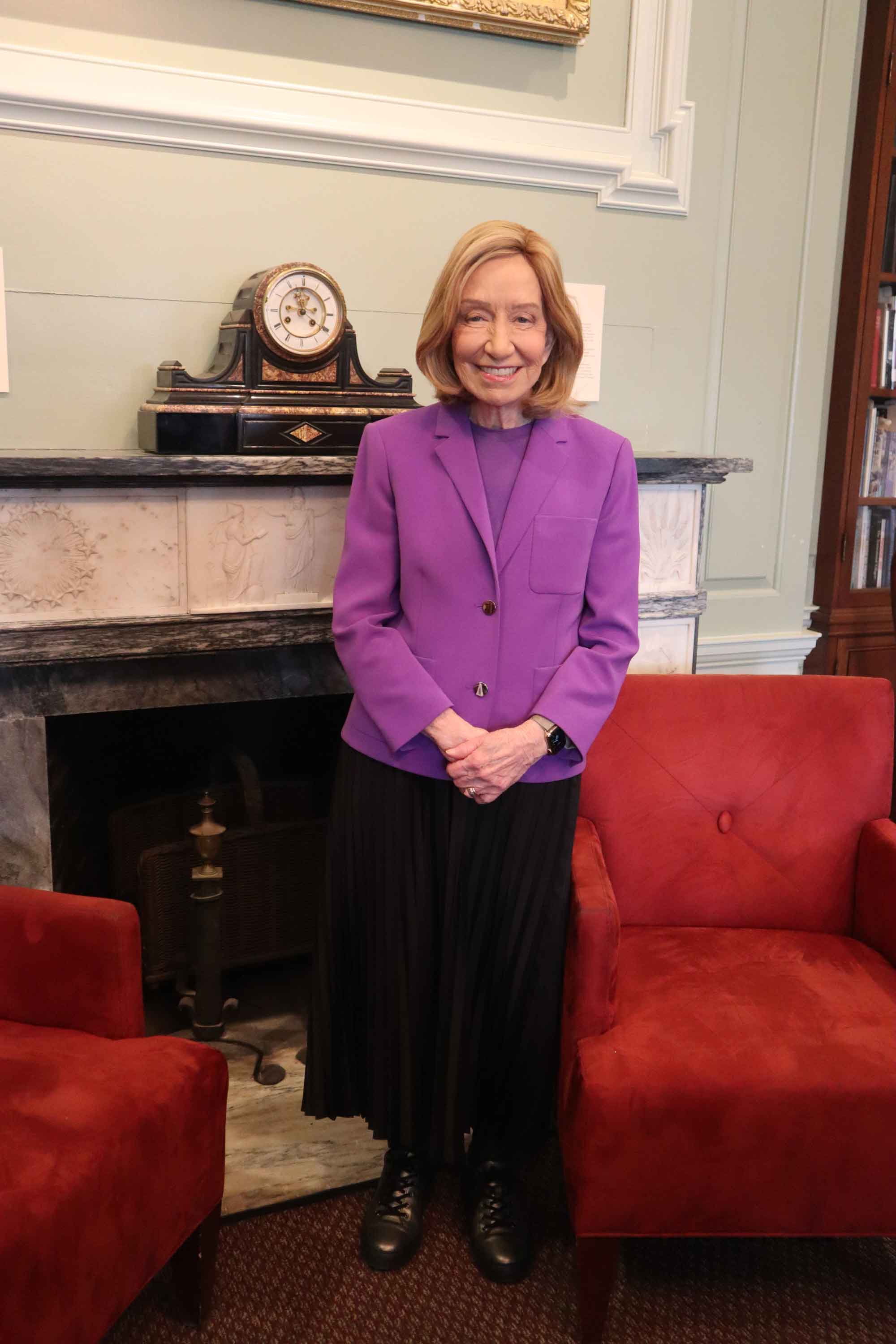
Doris Kearns Goodwin at the Concord Free Public Library
| Courtesy of Doris Kearns GoodwinA Love Story for Us All
What was clear to me, as I looked around the Goodwin Forum and listened to the powerful words of this woman whom I admire so deeply, was that this love story never ends. Not with Dick Goodwin, whose spirit is fondly remembered by so many. Not with Doris, whose words and presence inspire so many to embrace the responsibility to be good stewards of our community. And not with us – each one of us.
Despite the corporate news channels and social media networks vying for our attention and dividing us with algorithms designed to ignite passion and pit us against each other, we all remain an important part of this grand experiment called democracy. The Great Society is still alive – all around us. An Unfinished Love Story reminds us of that sacred duty to each do our part to ensure that America endures.
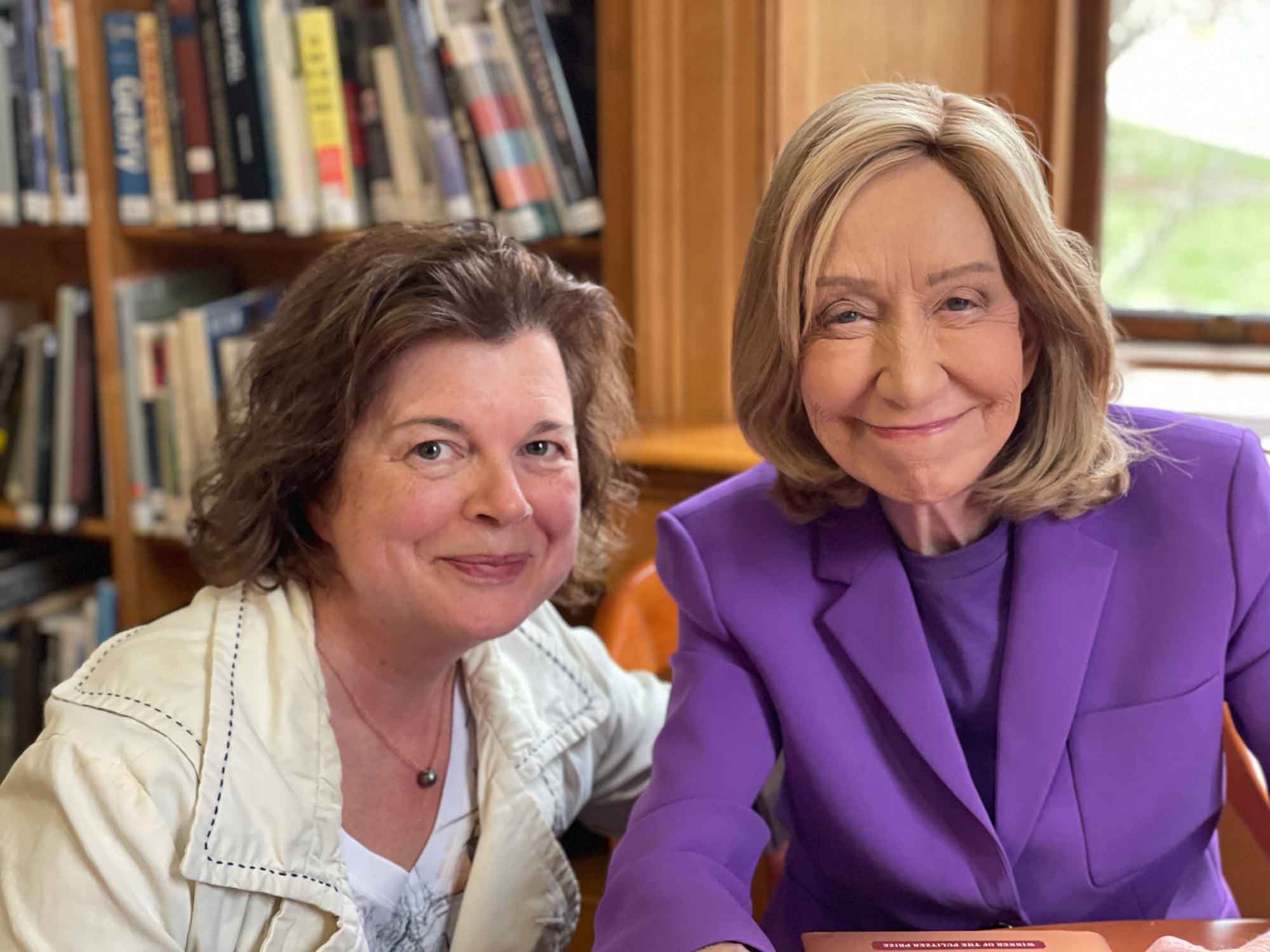
You can find a signed copy of some of Doris Kearns Goodwin’s books right in Concord Center at the Concord Bookshop. To learn more about the amazing woman we here in Concord have the privilege of calling friend and neighbor, please visit DorisKearnsGoodwin.com

